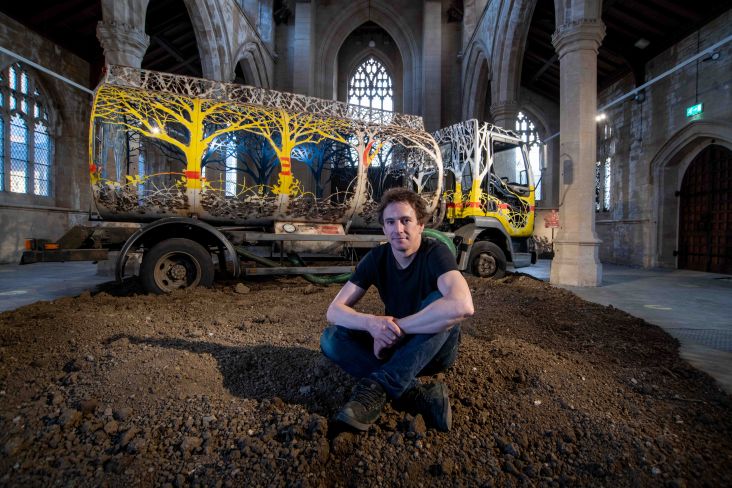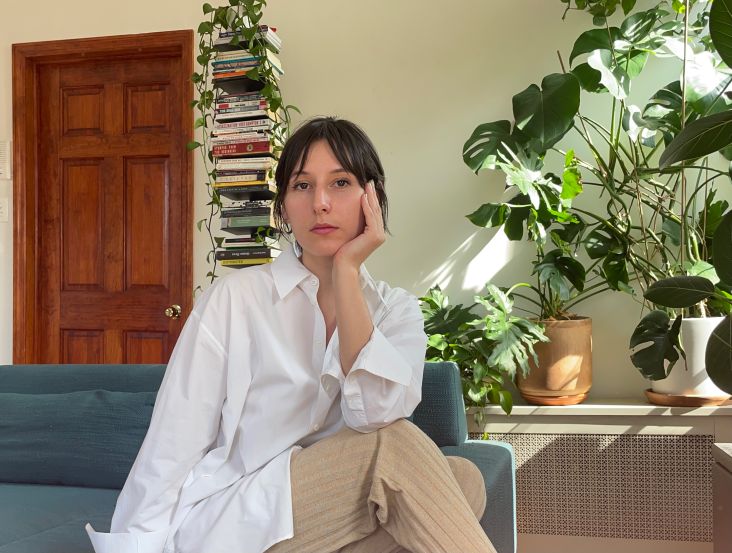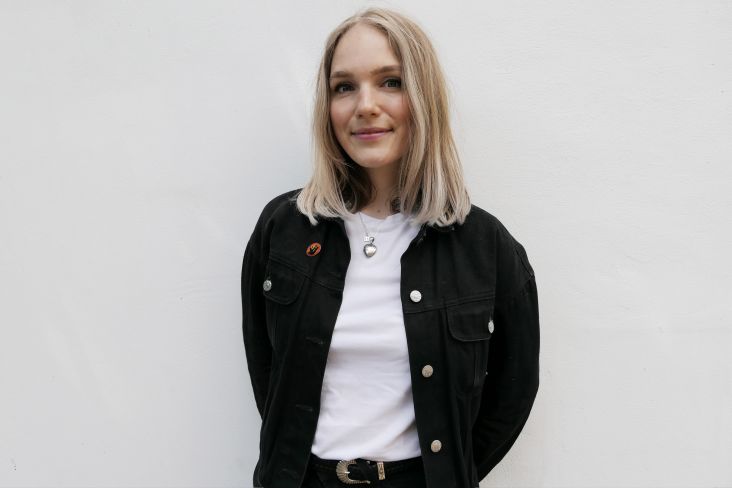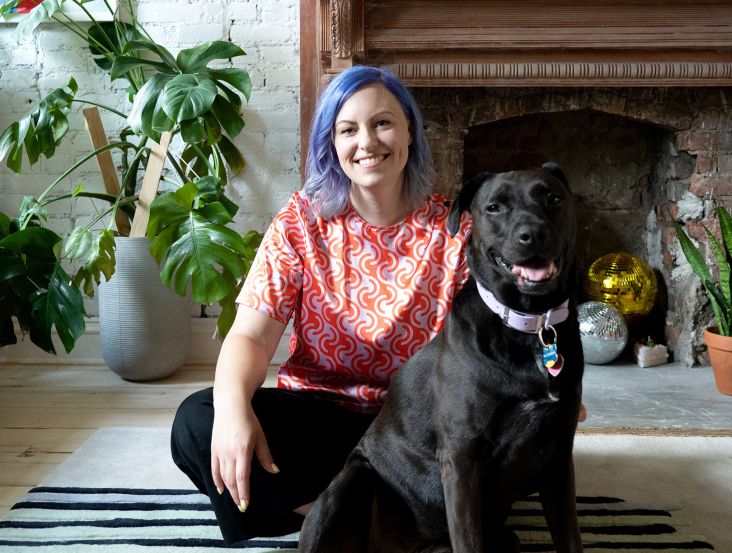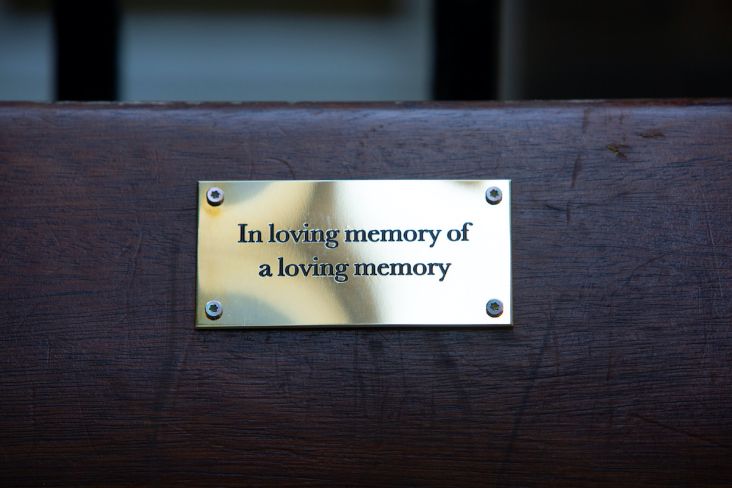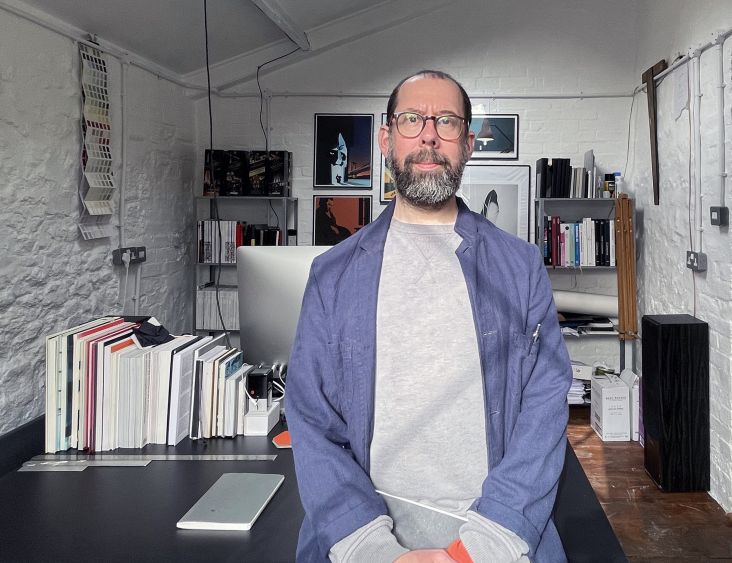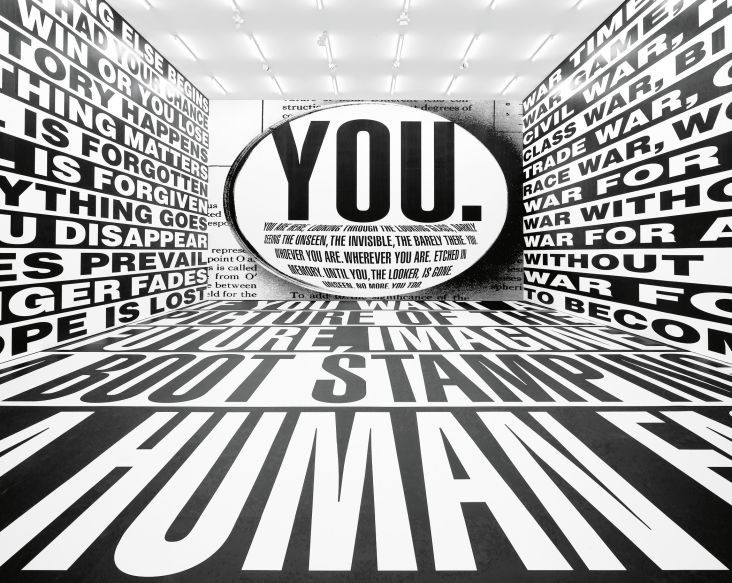Jahnavi Inniss on never going anywhere without a book, being a 'plant mom', and her top five recommendations
Producing work that explores and exposes the anonymous and undiscovered narratives within under-represented communities – with a prominent focus on the cultural disregard of Black British History – London-based designer, curator and creative producer Jahnavi Inniss has rightly garnered remarkable notoriety for her striking, innately thoughtful and fundamentally powerful work.
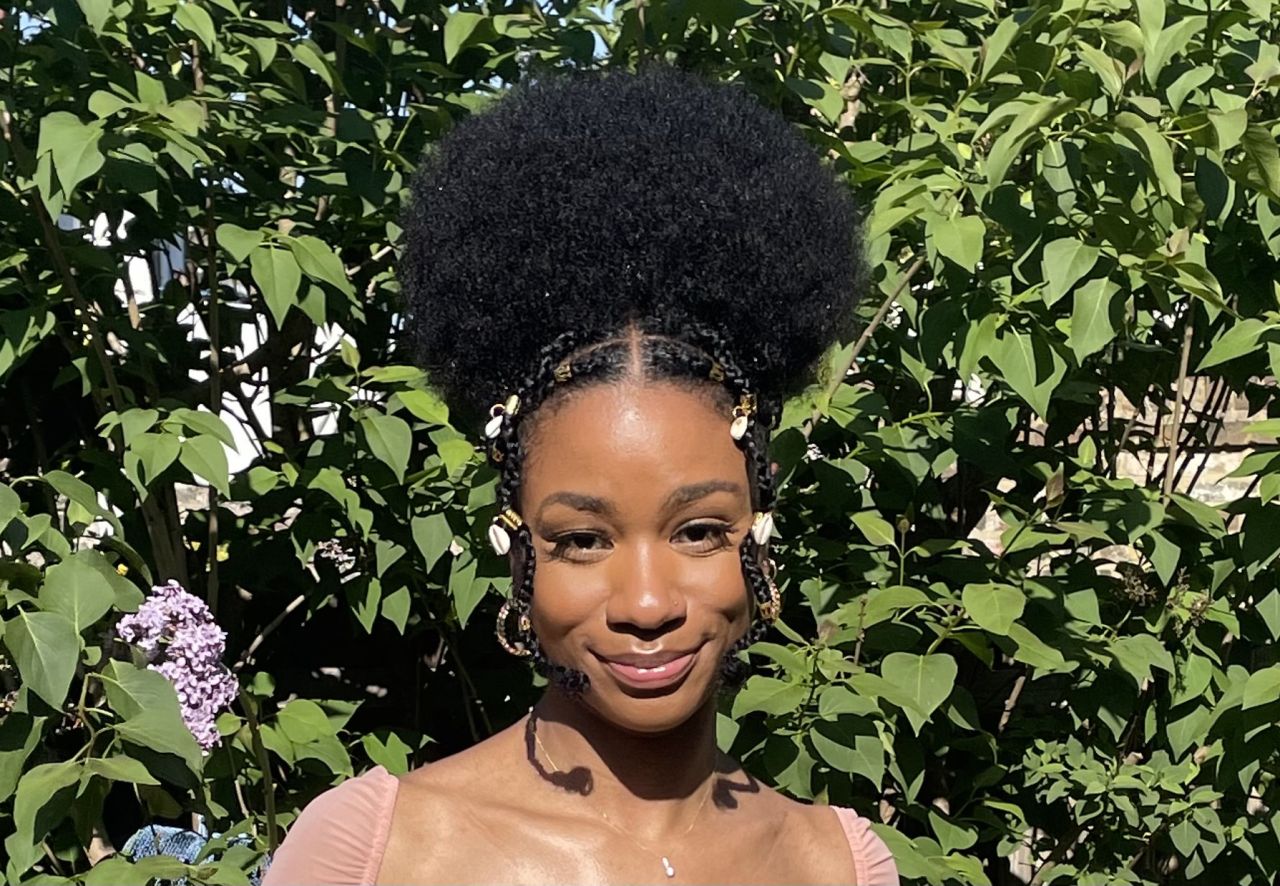
Working primarily in analogue media – from extraordinary quilting and letterpress to ephemeral collage and sculpture – Jahnavi has developed an artistic practice that blurs the lines between art, design and illustration, forging her own path and creating a totally unique practice in the process.
A lifelong avid reader, Jahnavi explains that her relationship to books has certainly changed, telling us "since a young age my dad always told me 'Never go anywhere without a book'," using any single moment going spare to engage her mind, develop her literarily skill-sets and learn. "I used to think it was impractical and only used to read at home until I started commuting to uni every day," Jahnavi explains, "where I became very familiar with train cancellations and delays." The plus side of these all-too-familiar delays, however, was the dedicated reading time they afforded; "I somewhat looked forward to the casual, poor running of the trains as it allowed for extra reading time," Jahnavi adds.
Having been somewhat impossible since lockdown, Jahnavi has since taken to reading more books about plants and subsequently owning the 'Plant Mom' title she has earned. Now with 18 plants in her bedroom alone, Jahnavi explains, "I've become increasingly aware of the value of plants and their dependency on me for survival," recommending 'Plantopedia: The Definitive Guide to Houseplants' by Lauren Camilleri and Sophia Kaplan for anyone also wanting to achieve a similar horticultural prowess. "It helps me to better understand my plants," Jahnavi tells us, "as well as fuelling my daydreams of having my own house with rooms full of plants from across the world."
Discussing the significance of books in both her personal and professional practice, Jahnavi notes the contextual understanding gifted by non-fiction, learning of the societal systems we live in and personal experiences of them from the social, cultural and political theory texts she reads. On the other hand, Jahnavi recalls, "whilst reading fiction, I'm able to expand my imagination," adding, "I find it extremely therapeutic to immerse myself in the world of each book as I vividly imagine each detail described by the author."
Referring back to her practice, Jahnavi explains the attentive meticulousness and unparalleled attention to detail is reflective of the significance books carry within them. "In everything that I create, I try to ensure that every element has meaning and is relevant to the piece itself," Jahnavi tells us, always committing to the heavy lifting of contextual research, theory and accuracy. "Whilst working with typography especially, I find reading extremely informative," Jahnavi adds, noting the gravity of elements such as typeface choice, line length, leading and kerning within individual books that she analyses. "It helps to develop my own practice and skills," Jahnavi concludes, "as I reflect on the influence the different typographic elements have on my navigation and interpretation of the book itself."
We have spoken to Jahnavi about her most highly regarded books, the impact they've made on her personal life, and the professional influence they've had on her creative career. Over to you, Jahnavi!
1. Parable of the Sower by Octavia E. Butler
It's a dystopian science fiction novel about an empath named Lauren who lives in a gated community in South California. Following an ecological disaster as a result of climate change, society completely collapses, and lots of different communities are formed. After her gated community is destroyed, she goes on a journey North for survival and builds her own sustainable community as well as her own religion along the way.
It was recommended to me by my dad. Octavia Butler is one of my favourite authors, and this book of hers, in particular, is one of my favourites because I read it in 2016, a time when there seemed to be a lot going on in the world. Notably, 2016 was recorded as the hottest year ever at the time, and Donald Trump was elected president of the US. The book eerily reflected society at the time, especially as the newly elected president in the book had the slogan 'Make America Great Again' as well as loyal supporters that travelled in mobs, violently attacking anyone that didn't conform to their president's ideal standards.
I also really loved the way Butler incorporated spirituality and Afro-futurism in Parable of the Sower. It's inspiring to see a black woman as the main character who facilitates her own unique religion in a science fiction novel. Prior to reading Octavia Butler, I had the perception that science fiction wasn't inclusive of black people as I hadn't seen examples of our existence in the future.
2. The Autobiography of Malcolm X by Malcolm X and Alex Haley
It tells the story of Malcolm X and his journey from being a young adult, having been incarcerated, converting to Islam and becoming a prolific human and civil rights activist.
Growing up, I'd always been taught of the principles and ideologies of Malcolm X, and I was always intrigued at how Malcolm X came to be. With the boldness of his name and the various conspiracies surrounding his violent murder, I wanted to get the full story.
I expressed these thoughts to my brother, and he plainly recommended I read his autobiography. It's one of my favourites because I feel it expanded my knowledge of many different themes within the book. I learnt about the different ideologies of the Nation of Islam from its inception, as well as the different practices involved when travelling to Mecca as part of Hajj. It really helped me to understand race relations and civil rights in late 1950s America whilst reaffirming my understanding of the need for self-determination and bluntness when tackling racism and inequality. I also love the style in which it was written. As it was the very first autobiography I'd read, I was surprised at how easy it was and the fact that it read like a novel.
It's inspiring to see a black woman as the main character who facilitates her own unique religion in a science fiction novel. Prior to reading Octavia Butler, I had the perception that science fiction wasn't inclusive of black people as I hadn't seen examples of our existence in the future.
3. All About Love by Bell Hooks
I'm part of a black feminist reading group; this book was on their reading list and was constantly referenced. It's a book that explores the meaning and value of love and considers the ways in which we can implement a love ethic into our daily lives.
I absolutely love this book because it completely transformed my view of the meaning and value of love. It encouraged me to explore love as the fundamental will to "extend one's self for the purpose of nurturing one's own or another's spiritual growth". Using this as the basis for my understanding of love, hooks encouraged me to consider implementing this love ethic into the ways in which I navigate my relationships with both my family and friends. Since reading the book, I definitely feel as though I have become a lot more compassionate and patient whilst maintaining relationships with family especially, as the book reaffirms the value of community and communal care.
4. After Dark by Haruki Murakami
I was recommended this book after expressing my desire to read more broadly. It's a short novel set in Tokyo about a young girl whose midnight adventures lead her to a place she least expected to be in order to help a woman in need.
This is one of my favourites because I love the way Murakami is able to shift the setting between reality and a dream world. I read it whilst I was in Cuba, and so reading it in a place with no internet, and old-fashioned cars, houses, Murakami's vivid descriptions and symbolism transported me to the other side of the world where I began to juxtapose Japanese culture in Tokyo with Cuban culture in Havana. (Possible spoiler?) Whilst one of the characters remained asleep for the duration of the book, the world continued to move on, and the main character experienced different adventures during this time. Whilst I remained disconnected from the rest of the world from Havana, Cuba, life in the rest of the world continued as normal. It made me reflect on the value and effects the internet has on our daily lives.
5. Girl, Woman, Other by Bernadine Evaristo
I was gifted this book for Christmas and had no idea what it was about, but I loved the cover, and so I started reading and couldn't stop. It beautifully tells the stories and lived experiences of "everyday" black women across London and other parts of the UK.
I love the book because a lot of the characters seem familiar to me in a way. Whilst it provides a contemporary representation of black women, I felt as though I could relate to some of the experiences and characteristics of different characters, especially Yaz. I love the ways in which some of the lives of the characters overlap and intertwine and continuously lead to the feeling of Sonder - "the realisation that each passerby is living a life as vivid and complex as your own". The best thing I love about this book is that it encouraged me to look into my ancestry (possible spoiler alert?) seeing how some of the characters were related and the contrast in the lives of the different generations within a family provoked some internal reflections about my own ancestors and the complex lives of the black women in my family that came before me.




 by Tüpokompanii](https://www.creativeboom.com/upload/articles/58/58684538770fb5b428dc1882f7a732f153500153_732.jpg)

 using <a href="https://www.ohnotype.co/fonts/obviously" target="_blank">Obviously</a> by Oh No Type Co., Art Director, Brand & Creative—Spotify](https://www.creativeboom.com/upload/articles/6e/6ed31eddc26fa563f213fc76d6993dab9231ffe4_732.jpg)








